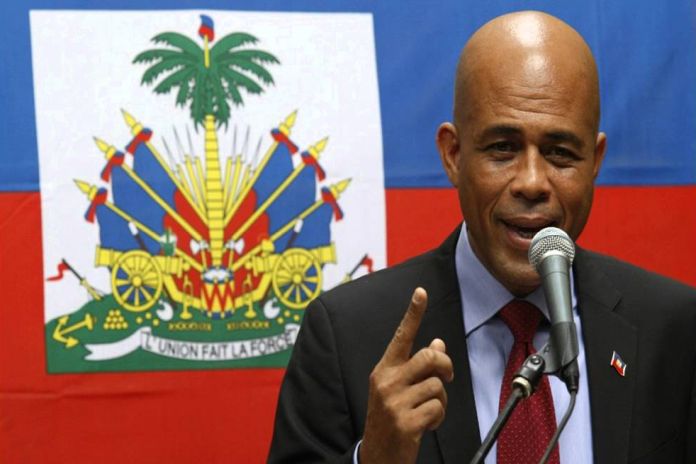By Caribbean News Global ![]()
USA / HAITI – The United States on August 20, 2024, designated former Haitian president Michel Martelly for his role in the global illicit drug trade, reported by Vedant Patel, principal deputy spokesperson, US Department of State.
“Martelly abused his influence to facilitate drug trafficking and has sponsored multiple Haiti-based gangs. Narcotics trafficking and gang-related violence have contributed to political instability and insecurity in Haiti, which has created an untenable living situation for the Haitian people,” said the US Department of State in a press release. “It is unacceptable for Haitian political and economic elites to plunder Haiti’s future. Today’s action demonstrates the United States’ unwavering resolve to promote accountability for all individuals whose activities contribute to gang violence and destabilize the political environment in Haiti, regardless of their rank or stature.”
The US Department of the Treasury’s Office of Foreign Assets Control (OFAC), noted that the sanctioned former president of Haiti, Michel Joseph Martelly (Martelly), is pursuant to Executive Order (E.O.) 14059 of December 15, 2021, “Imposing Sanctions on Foreign Persons Involved in the Global Illicit Drug Trade.”
“Today’s action against Martelly emphasizes the significant and destabilizing role he and other corrupt political elites have played in perpetuating the ongoing crisis in Haiti,” said Acting Under Secretary for Terrorism and Financial Intelligence Bradley T. Smith. “The United States, along with our international partners, is committed to disrupting those who facilitate the drug trafficking, corruption, and other illicit activities fueling the horrific gang violence and political instability.”
The existence of widespread gang activity and human rights abuses in Haiti creates a permissive environment for drug trafficking activities, and the country is a transit point for illicit drugs entering the United States. Many of Haiti’s political and business elites have long been involved in drug trafficking and have been linked to the gangs responsible for the violence that has destabilized Haiti. The United States is committed to promoting accountability and charting a more prosperous, democratic, and secure future for all Haitians.
Martelly abused his influence to facilitate the trafficking of dangerous drugs, including cocaine, destined for the United States. Additionally, Martelly engaged in the laundering of illicit drug proceeds, worked with Haitian drug traffickers, and sponsored multiple Haiti-based gangs. Martelly was previously sanctioned by the Government of Canada on November 17, 2022.
Martelly was sanctioned today pursuant to E.O. 14059 for having engaged in, or having attempted to engage in, activities or transactions that have materially contributed to, or pose a significant risk of materially contributing to, the international proliferation of illicit drugs or their means of production. Today’s sanctions action imposes several prohibitions related to Martelly, and OFAC has added Martelly to the Non-SDN Menu-Based Sanctions List (NS-MBS List).
OFAC coordinated closely with the Drug Enforcement Administration on this sanctions action.
Sanctions implications
As a result of this action, OFAC is imposing the following prohibitions described in section 2 of E.O. 14059: (1) U.S. financial institutions are prohibited from making loans or providing credit to Martelly; (2) Any transactions in foreign exchange that are subject to the jurisdiction of the United States and in which Martelly has any interest are prohibited; and (3) U.S. persons are prohibited from investing in or purchasing significant amounts of equity or debt instruments of Martelly.
US persons may face civil or criminal penalties for violations of E.O. 14059. Non-US persons are also prohibited from causing or conspiring to cause U.S. persons to wittingly or unwittingly violate U.S. sanctions, as well as engaging in conduct that evades US sanctions. OFAC’s Economic Sanctions Enforcement Guidelines provide more information regarding OFAC’s enforcement of U.S. sanctions, including the factors that OFAC generally considers when determining an appropriate response to an apparent violation.
The power and integrity of OFAC sanctions derive not only from OFAC’s ability to sanction persons, but also from its willingness to remove sanctions consistent with the law.
The ultimate goal of sanctions is not to punish, but to bring about a positive change in behavior. For information concerning the process for seeking removal from an OFAC list, including the NS-MBS List, please refer to OFAC’s Frequently Asked Question 897 here. For detailed information on the process to submit a request for removal from an OFAC sanctions list, please click here. For more information on the individual sanctioned today, click here.
Related Links:
- Bureau of International Narcotics and Law Enforcement Affairs Bureau of Western Hemisphere Affairs
- Combating Drugs and Crime
- Haiti Narcotics
- Office of the Spokesperson
Policy issues – Combating drugs and crime
The United States is deeply affected by crime and violence carried out by transnational criminal organizations, including drug cartels. These actions undermine our border security, inflict harm in our communities, and threaten the stability of our allies around the world. Today, the trafficking of overseas-produced illicit fentanyl, heroin, and other opioids into the United States is fueling a national epidemic with fatal consequences. The CDC reports that US drug overdose deaths surpassed 72,000 in 2017, representing a worrying increase from the already high 2016 number. Trafficking of illicit methamphetamine, produced outside US borders, into our country is also increasing.
US-Haiti relations
When Haiti is more prosperous, secure, and firmly rooted in democracy, Haitians and Americans benefit. U.S. policy toward this close neighbour is designed to foster the institutions and infrastructure necessary to achieve strong democratic foundations and meaningful poverty reduction through sustainable development. The United States provides substantial humanitarian assistance so the most vulnerable Haitians can better meet their basic needs.





